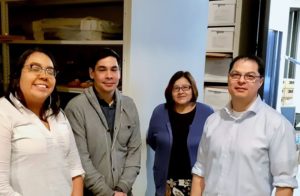Visit to the Ojibwe Cultural Foundation

By Laurie Leclair
M’CHIGEENG FIRST NATION— Founded in 1974 with a mandate to preserve and renew Anishinabek culture, language, arts, traditions and spirituality for the people of Mnidoo Mnising and its environs, the Ojibwe Cultural Foundation (OCF) holds a museum, art gallery and gift shop, an Ojibwe immersion kindergarten and Canada’s first all Anishinaabemowin radio station. It also offers language resources, traditional cooking lessons, a healing lodge and a large performance space. The effort to provide these services continues despite facing financial challenges.
On Feb. 19, 2020, the OCF gave Kevin Restoule, Government Relations Coordinator at the Anishinabek Nation and researcher Laurie Leclair a tour of its archaeological holdings. Executive Director Evan O’Leary, Finance Officer Sophie Corbiere, and Archivist and Program Coordinator Naomi Recollect opened the small but well-kept facility that houses a wealth of archaeological collections, painting and beadwork, baskets and other culturally significant items. They answered questions about the artifacts, accession and issues over repatriation. Following the tour and considering all of the various cultural activities the foundation hosts, Restoule remarked, “The OCF appears to be much more than a simple storage facility for archaeological collections or even more than just a museum. They are a caring, culturally appropriate home for Anishinaabe Sacred Items.”
According to Corbiere, these collections came to the OCF via a huge transfer of materials by Ontario’s Ministry of Heritage, Sport, Tourism and Culture Industries (MHSTCI)’ antecedents that amassed between the 1950s through to the 1990s. They were originally stored in the Ministry’s Sault Ste. Marie facility, but when that closed in the late 1990s, they were shipped to a space in Sudbury. The collection included documentation from fieldwork, soil and rock samples and about 300 boxes and drawers of artifacts. The artifacts varied in provenance, age and culture with collections representing Indigenous, Euro-Canadian and fur trade societies. When it became apparent that these items would be moved a second time, out of Sudbury and possibly to London, interested parties lobbied to have them sent to the OCF.
In 2013, the OCF entered into a stewardship arrangement with the province, agreeing to physically care for the collection. The transfer, which included a smudging ceremony, took place in June 2014.
“It was a very moving day for everybody involved,” recalled Meagan Brooks, Archaeology Licensing Officer at MHSTCI.
Not only would the items be housed in an appropriate environment, they would be able to be curated and accessed by Indigenous communities.[1] OCF’s former Executive Director Anong Migwans Beam worked closely with Brooks, and together they made sure that the items were kept in archivally-sound boxes and packing and that the storage facility at OCF met the Ministry’s standards.
Now Corbiere and Recollect work with Elders to assure that the collections also meet Anishinabek standards of care and respect. Together, they also hope to augment the OCF’s offerings to include a physical expansion of the available area for storage, safekeeping, and ceremonies. They wish to use the sacred and cultural items, when appropriate, to educate students and the public at large.
There is a wealth of learning and outreach opportunities here at the OCF from facilitating studies in material culture, training field monitors, working with Elders and language to cultivating an entire new generation of archaeologists and community advocates through hands-on collaborative experiences with state of the art artifact replicas. Their goal is to secure long-term, reliable core funding that will bring much-needed
stability to these programs. The ability to plan ahead would help with the development of a collections management and acquisition policy, expand staffing capacity and training, as well as cultural enhancements like the library and traditional arts program. Along with the need for core funding, the OCF is seeking allies both within and outside of the Indigenous community to help with exposure, to tell both Anishinabek communities and the public that all are welcome to visit.
The OCF operates through funding from Canada, Canada Arts Council, Ontario Trillium Foundation and Ontario Arts Council. It is open Monday to Friday 8:30 am to 4:30 pm and admission is by donation. Donations can also be made directly on the OCF website.
[1] Meagan Brooks, Ministry of Tourism, Culture and Sport. Indigenous Collections Symposium: Promising Practices, Challenging Issues and Changing the System. Ontario Museum Association, March 23-24, 2017 Six Nations Polytechnic, Ohsweken and Woodland Cultural Centre Brantford, p. 23.

